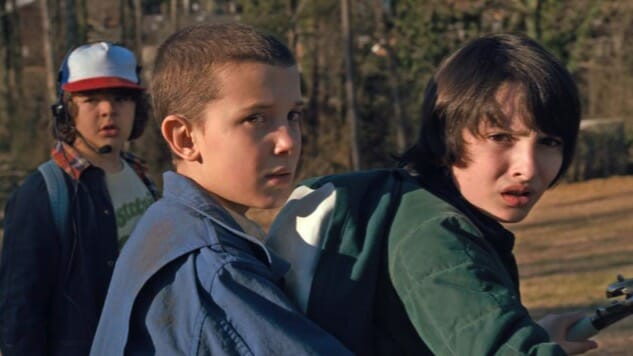
The year is 1983. The setting is leafy, suburban Spielbergia—you’ll recognize it from Close Encounters of the Third Kind and more obviously ET. In this case, it’s a small town named Hawkins wherein government scientists have accidentally opened up a portal to another dimension, a la Stephen King’s 1980 novella (and later 2007 movie) The Mist. A group of misfit schoolkids (think Stand By Me meets The Goonies) on the hunt for missing friend Will Byers after his apparently haunted house appears to consume him (Poltergeist), are pursued by FBI agents after they befriend a super-powered being (ET, again) violently coming of age upon learning she has powerful psychic abilities (Firestarter, Carrie).
Meanwhile, Joyce Byers (Winona Ryder), the single matriarch of a broken family (take your pick of Spielberg films), takes the family home apart as she becomes obsessed with locating her abducted child (combining the Melinda Dillon and Richard Dreyfuss characters in Close Encounters). Her other, still-earthbound son, Jonathan (Charlie Heaton), convinces girl-next-door of his dreams Nancy (Natalia Dyer) that he’s not a loser after all (name that John Hughes movie!), though he has competition in her Tom Cruise in Risky Business-type boyfriend, a jock who gradually reveals there’s sensitivity beneath the rebellious charm (name that other John Hughes movie!). They all team up with cynical local police chief Jim Hopper (David Harbour), an alcoholic former golden boy made bad by grief—like every maverick ‘80s cop hero, basically—to discover the truth about Will.
Meanwhile, the faceless beast from another dimension that snatched young Byers stalks our heroes like a hybrid of the xenomorph and a creature from The Thing, and stores its victims alive in gross cocoons as in James Cameron’s Aliens. There are Star Wars references, allusions to Scanners, a protracted fight in an alleyway, as in John Carpenter’s They Live—and it’s all topped off with a Carpenter-esque synth score, pulsating from the first minute to the last.
If you were a child of the ‘80s and ‘90s, chances are you’ve seen Stranger Things before. An eight-part sci-fi spectacle and shiny new Netflix original from filmmaking brothers Matt and Ross Duffer, Stranger Things is spooky supernatural entertainment unashamedly in the 1980s popcorn mould. It won’t be a problem for today’s kids less familiar with that period in film, but for those that recognize the influences—anyone who’s been paying attention to pop culture over the last 30 years, probably—there’s nothing surprising about Stranger Things. In fact, there’s barely an original idea across its six-and-a-half hours. Instead, it constantly recalls old stories.
There’s an argument to be made that this is in fact Stranger Things’ ‘original’ concept: arranging shopworn ideas in a new and interesting way. Collaging is considered an art, and it no doubt takes talent to make a worthwhile season of television almost entirely out of borrowed parts. Which isn’t to say Stranger Things is like some scrappy mish-mash; like Quentin Tarantino, the Duffers only cadge ideas from the best, but are more importantly talented enough as storytellers to use those ideas in effective ways.
The difference between them and QT is that, where Tarantino tends to borrow from cinema both mainstream and obscure, the self-styled ‘The Duffer Brothers’ (honestly, there’s nothing about this show that doesn’t smack of self-awareness) have lifted solely from some of the biggest hits of the last few decades. Stranger Things has as touchstones those popular movies that viewers of a certain age—say, the age of the average Netflix subscriber immediately recognize. If we’re to presume that that’s calculated, we must assume there’s a good reason why the Duffers chose this route, beyond the mere fact that they themselves enjoyed these movies in their youth.
On the one hand, in jumbling together an assortment of films so well-remembered and well-loved by ‘80s, ‘90s and even many ‘00s kids, the show plays like a sort of collective fond memory for that (wide) audience. It’s hard nostalgia, where even the casting is designed to, in the words of Vulture’s Jen Chaney, “fire up the neurons in our nostalgia pleasure centers.” Stranger Things is foremost here to give those in on the referencing the kind of fuzzy feelings they got watching these movies as kids.
For those who never experienced this period the way the Duffers and many others of their generation experienced it, Stranger Things is still more than just a greatest hits package of ‘80s pop cinema. Through mining select classics from the era, the show captures something—a vibe. This series, better than any other recent effort to ape similar sources (Midnight Special, Super 8, Tomorrowland), nails the sweet and inclusive (yet also, often genuinely scary) comic feel of the ‘80s popcorn flick. It’s a type of movie—magical, concept-driven, unapologetically fun—that seemed to be churned out almost effortlessly at the time, but which Hollywood had lately apparently forgotten how to make. Happily, Stranger Things has remembered the formula.
It feels like this show, committed to transporting viewers to a place of comfortingly familiar wonder, has come along at the right time. Go to the cinema in 2016, and you’ll find the screens are clogged with self-consciously ‘dark’ blockbusters (think Batman vs Superman or the interminable X-Men: Apocalypse). Then you get home, switch on the news, and discover that yet another atrocity has been committed against a backdrop of growing world disorder. The ‘80s wasn’t as innocent and sugary as Stranger Things would have you think. Back then, the world had troubles of its own—a recession, the AIDS crisis, a resurgent nuclear threat—but a trip to the multiplex at least allowed audiences to escape into that decade’s particular celluloid fantasy world for a couple of hours. Thanks to Stranger Things, we have a rare modern opportunity to go back to that place again.
Brogan Morris is a UK-based freelance writer, as seen on the Guardian, Little White Lies, Flavorwire, the BFI, the New Humanist and more. Opinions range from ridiculous to passable. You can follow him on Twitter.